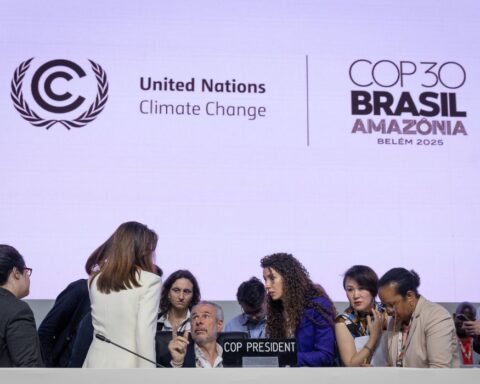For decades, the climate crisis has been a theme in apocalyptic movies and television shows, as well as a whole subgenre of books known as “cli-fi.” But there is one relatively untapped medium that researchers say could prove fruitful for spreading the message of a warming planet.
A growing number of video games, such as Horizon and Terra Nil, have themes or plots related to the climate crisis. Researchers say that the medium has huge potential to educate gamers and help galvanize them to take action on the greatest threat to humanity.
A recent study by researchers at Yale University shows that video game players are slightly more likely than the general public to view collective action on climate action positively, busting the stereotype that gamers are merely apathetic teenagers sitting in their parents’ basements. They’ve even been pushing the emissions-intensive gaming industry to clean up its act.
Given that there are more than three billion people playing video games in the world, whether on consoles, computers or smartphones, the medium offers a vast pool to target for communications professionals working in the climate space. “Games create engaging and immersive worlds. So they’re a really great way to bring people in to start that conversation about climate change,” says Jennifer Carman, one of the study’s authors and a deputy research manager with the Yale Program on Climate Change Communication.
The social aspect of video games (whether they’re played with other people online or in person) can help start conversations about things portrayed in games that are actually happening in the real world. And that social aspect can also help galvanize action.
This can be seen in the world of video game streamers (online personalities who broadcast themselves playing games online), where influencers such as Jimmy Donaldson (also known as MrBeast) and Mark Rober have spread the word about the climate crisis and used their platforms to fundraise for environmental causes. For Donaldson, that meant launching fundraising campaigns that have raised more than US$23 million for a tree-planting initiative called Arbor Day Foundation and more than US$30 million for Ocean Conservancy and The Ocean Cleanup.
Researchers say that players can also develop a feeling of control in games they don’t get from other mediums, as they make decisions that drive the narrative forward. “I think having that sense of agency in a game [and] looking at a real-world topic can give you the belief that you have made a difference in a game, and you can do that in the real world, too,” says Marina Psaros, a co-author of the study, who used to be the head of sustainability at Unity Technologies.
Video game studios have increasingly injected narratives about climate change into popular games. A separate Yale survey found that 22% of video game players surveyed had come across some kind of climate change–related content in games in the previous 12 months and that 63% of them said they feel a personal sense of responsibility to help tackle global warming. When it comes to taking action, 43% said they have refused to buy the products of companies that have opposed strong climate policies.
Pushing for corporate action
In turn, the industry is starting to take its own emissions more seriously. The data centres that support online gaming and the semiconductor chips used in video games eat up a lot of energy. In 2019, the gaming industry emitted an estimated 24 million tonnes of carbon dioxide in the United States alone – which was the carbon footprint of the entire nation of Mongolia that year.
Among the companies that have been working to lower their emissions is Epic Games. The company has made some changes in its popular game Fortnite that it says will reduce the global electricity use of the game by 200 megawatt hours per day. Many of the large tech companies that manufacture games and consoles, such as Microsoft, Apple and Google, have committed to reaching net-zero by 2030. Other companies have less ambitious targets. Sony has pledged to be net-zero by 2040, and Activision says it will reach that target by 2050.
While the industry’s carbon footprint is a work in progress, green themes are proliferating. So much so that the United Nations Environment Programme (UNEP) has recognized the power of video games as a communications tool to spread environmental messages. Every year since 2020, UNEP has held what it calls the Green Game Jam that challenges video game creators to inject a particular environmental theme into their games. The developers of popular smartphone games like Angry Birds, Boom Beach and even Pac-Man participated.
Carman says that it’s important for communications professionals not to get stuck on the traditional audiences for climate messaging and that video gaming can at the very least prompt people to talk about the climate crisis. “It can start those conversations that can prompt people to take action, and that’s what we want people to do,” she says.







